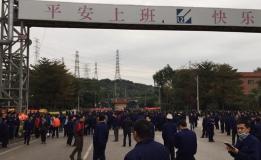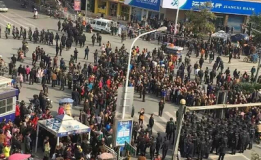


Hundreds of workers at the state-owned steel firm Ansteel in Guangzhou went on strike on 17 February, shutting down the entire factory of 2,000 workers. Ansteel took over operations of the previously Taiwanese-owned Lianzhong Stainless Steel last year. New Ansteel management began to lay off workers, increase workloads, and put hundreds of workers on leave with little pay.
After the New Year, the company announced a new performance-based pay system and claimed that the company union had approved the plan on behalf of the workers. Hundreds of workers went on strike and organized demonstrations on factory grounds, demanding to sign new contracts with Ansteel. Riot police soon intervened to break up the demonstrations.
A union official was sent to offer concessions, though workers ignored him. In an interview, one worker remarked that the union was “absolutely useless. There is nothing democratic about it.” The strike dwindled under continued police pressure and ended after management promised to revoke the pay system.

Coal miners in Anyuan, a former revolutionary base of the Chinese Communist Party in Jiangxi, went on strike this week after being put on leave as management prepares to address overcapacity.
The state-owned Pingxiang Mining Group shut down its coal mines during the Lunar New Year and put workers on leave, paying them just 470 yuan per month. Around 150 workers blocked an intersection in the city of Pingxiang on 29 February. Large numbers of police arrived to clear the protest and reports on social media claimed several workers were beaten and one hospitalized.
The Pingxiang Mining Group released a statement later that day claiming that government officials had arrived on the scene to negotiate and that workers were “basically stable.” The following day however protests grew to several hundred workers marching through streets with banners reading “Workers want to live, workers want to eat”. The company stated it will examine the possibility of reopening the mines later this month.